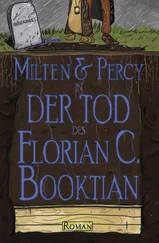Walking slowly toward the Christmas tree, I felt with my foot for the recess. When I reached it. I sat on the edge of the concrete and waited, hoping that dark as it was I might still be able to see something. After a while it became possible to make out a glimmer of pipes against the dark. Standing, I felt for the top pressure gauge and held the flashlight close to it. It read 38 PSI. I closed the valve below it watching the needle fall to zero. I propped the flashlight, slanted up, in the wheel of the bypass valve. The big Stillson wrench wouldn’t move the gauge at first. I was afraid of breaking it off but finally I was able to get a purchase on the fitting below the gauge. It took all I had to start it. When it came off, I tried the three-inch Gerona nipple. That was the trouble. Naturally the plastic nipple didn’t fit the threaded metal sleeve but simply abutted it. The Gerona pipe could not be threaded so there was nothing to do but make a crude abutted joint and seal it as best I could with PBC compound and many wrappings of duct tape. A bad job but it should hold against the low pressure.
The rest was simple: a ninety-degree elbow and three ten-foot sections of the Gerona which reached to within a foot of the main intake duct of the new fifteen-ton Carrier. Using the Bowie knife, I sliced off fiberglass insulation until metal showed. Then, using it like a chisel and the Stillson as a hammer, I made an X in the sheet metal and bent the corners in. Then drive a nipple into the opening — take care not to lose it! — and connect it with the Gerona system with a sleeve and another nipple. Slice off more fiberglass, pack it into the crude joint, seal with compound, and wrap the whole with the rest of the duct tape, perhaps fifty feet or so. The difficulty was propping the flashlight at the right angle.
How strange memory is! Do you know what my memory records as the most unpleasant experience of that night? The damn fiberglass. Particles of it worked under my sleeve and collar. It makes my neck and arms itch just to think of it. Death’s banal, but fiberglass in the neck is serious business.
I switched off the light and sat leaning back against the chimney gazing up into the darkness and waited for the compound to set.
Then I opened the valve. The gas made no sound in the pipe. At least I could not hear it, but I fancied I could feel a slight shudder in the ten-foot sections of Gerona. Naturally there was no smell because the captan which gives house gas its characteristic odor had not been added.
Sticking the knife and flashlight back in my hunting coat, I picked up the two kerosene lamps and went upstairs in the dark.
At the top of the hanging staircase in the upper hall it was pitch black. But I knew every inch. A foot or so (I reckoned) from the cathedral chair I set down the kerosene lamps and put out my hand — yes, it was there, the chair. I listened. There was no sound but the murmur of the storm and the creak and pop of the timbers in the attic, as if Belle Isle were laboring through heavy seas. Somewhere a window glass broke. There was no sound from the bedrooms.
I went to each door, Troy’s Margot’s, Raine’s. At Raine’s door there was a different kind of murmuring, an overtone to the storm. A weak watery light flowed through the crack in the door.
I felt along the wall until I touched the air-conditioning register. My hand felt nothing, but when I put my face against it, there was a cool breath against my cheek. There was no odor. It could have been air.
For a long time I stood at Raine’s door. I can’t remember whether I was listening or thinking or doing nothing. What I remember is that it was possible to stand there at least twenty minutes, hands at my sides, without fatigue, registering the sensations of my body. My heart was beating slowly, my breathing was deeper than usual — was it the low pressure of the storm? The storm roared softly like a conch shell over my ear. The fiberglass was beginning to bother my neck.
Then, taking some thirty seconds to do so, I opened the door. So well did I know every inch and quirk of Belle Isle that without thinking I put a slight strain upwards on the silver doorknob while turning it because the heavy door had settled on its hinges and the latch did not move easily.
The door opened at the rate perhaps of an inch every five seconds. The first thing that came into view was the curio cabinet next to the iron fireplace, then a corner of the bed. The light probably came from an electric camp lantern set on the floor. The weak light seemed to radiate in rays, like a child’s drawing of light.
Once several years ago, passing in the hall, I heard Elgin in this bedroom conducting a tour, eight or ten Michiganers. “This cabinet was sealed up before the Civil War.” There was a marvel about it which Elgin saw and the tourists liked and I hadn’t thought of, this small volume of 1850 air trapped and sealed in glass. Elgin had a sense of the legendary. “These little bilbos you see still have General Beauregard’s fingerprints on them.” Bilbos? Where did he get that? He must have meant bibelots, the little bric-a-brac figures.
The door was opening without a noise. Or if there was a noise, it could not be heard. The storm beyond the shuttered widow was like a heavy surf.
There was the Ray-O-Vac lantern, not on the floor but on the bedtable, shedding a small cone of rayed light.
Troy Dana was lying prone on the far edge of the bed, naked, his face buried in the pillow.
Raine was standing at the window, even though the shutters were closed and locked. Lightning made yellow stripes through the slots. She wore a short hip-length nightgown — shift? — which left her legs bare. Her legs were short but well developed. She looked like a fourteen-year-old girl who had spent twelve years dancing.
Appearing silently beside her. I thought to startle her, but she turned to me as if I had always been there.
“Isn’t it beautiful?”
“What?”
“The hurricane.”
“Yes.” All one could see through the shutters were the heaving and whitened oaks.
“Look at that faggot. Passed out. OD’d. In this lovely hurricane.”
“Will he be all right?”
“Oh sure, unfortunately.”
I saw too that she was drunk with something not alcohol. Her face was close under mine and her breath had a sweet chemical smell. Her voice was not slurred but low and bell-like. Her eyes winked gold in the lightning. The only sign of intoxication was her incapacity for surprise. Whatever happened was the occasion of a mild disconnected wonder, my appearing — or General Beauregard appearing.
“You didn’t know that I went for you?”
“What?” I said, cocking my ear away from the storm.
“You know, like going for somebody.”
“You did?”
“You’re so dumb! And with all that going on—” She waved vaguely toward the hall (by no means drunk or even swaying, but mainly flat and unsurprised: for her one thing was more or less like any other, and could be spoken of in her low bell-like voice).
She put her hands on my belt buckle, grabbed it with her fingers stuck inside, and gave me an odd little jostle.
“Couldn’t you tell?”
“Tell what?” I gazed into her gold eyes.
Her mild gold gaze drifted indifferently from me to Troy to the hurricane.
“My God, isn’t that something.” Through the shutters I could see a big white socket where a limb had been ripped off one of the oaks. “Does it turn you on?”
“To what?”
“Me,” she said like a drowsy little temple bell. She put her arms around my waist, locked her hands, and squeezed me with surprising strength. “You’re a big mother.”
I pulled her up to me. She was like a child, but broader, a broad child.
“Let’s lie down,” she said, tugging fretfully at my buckle. “I’m sleepy.”
Читать дальше












